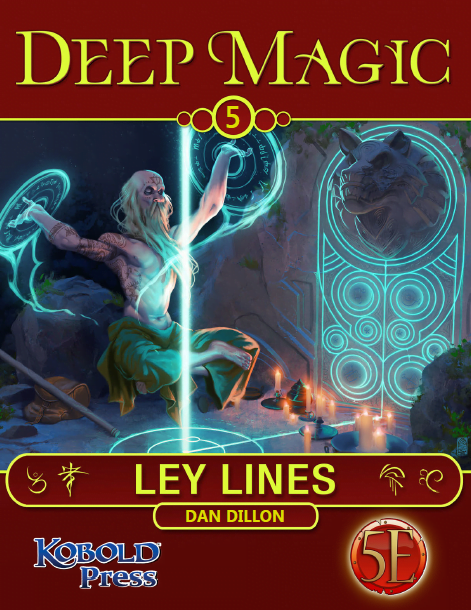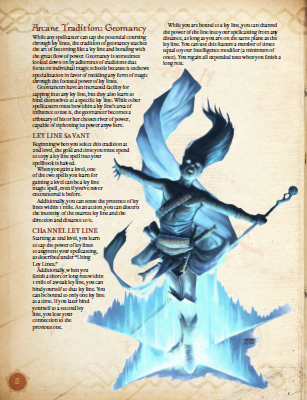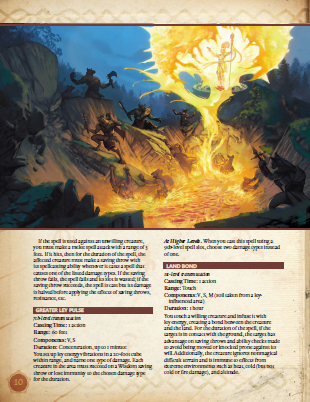Description
Draw Upon The Deep Magic of the Land!
Magic flows like an invisible river, wending across the landscape. Most cannot see the ley lines; but to you, trained in the arts of geomancy, they blaze as glowing torrents of energy, pulsing bands of light, glittering strings. This power, the power of the land itself, is yours to draw upon.
In 14 arcane and astounding pages, Deep Magic: Ley Lines brings the secrets of ley line magic into your 5e campaign, featuring:
- Random tables for the effects of weak, strong, and titanic ley lines on your spells, as well as ley line backlash
- Two new feats—Ley Initiate and Ley-Bound—and a new Geomancy arcane tradition
- Using ley lines in the Midgard Campaign Setting
- 15 new spells, including ley storm, land bond, ray of life suppression, volley shield, and more!
The wise see the world as it truly is: a shimmering net of flowing magic. Plunge your hands into its torrents, and charge your spells with unfathomable power!





Megan –
Ley lines are channels of magical energy that criss-cross the land – many people in the real world believe they exist, so it’s reasonable to suppose that you can find them in worlds where magic is real! Here, they are accessible to casters of both arcane and divine magic. Details of where they are to be found (along with a note on their presence in the Midgard Campaign Setting) and how they are detected are accompanied by notes on how they are actually used – basically, a caster taps into ley line energy to provide a burst of power to the spell he is casting at the time. The effects can be a bit unpredictable, but a caster can ‘lock’ a particular ley line to get rather more consistent results.
If you do use the Midgard Campaign Setting there’s a map showing where the ley lines are. If you don’t use it, the map will serve as an example of how to distribute them across the surface of your chosen campaign world.
Tapping in to a ley line requires specialist knowledge, provided by taking the appropriate feat (or by studying with a geomancer during downtime), and a die roll to measure the level (if any) of success. Random effects can be obtained even from a ‘locked’ ley line if the roll to tap the line is not very good. Several tables, based on how powerful the ley line is, are provided to supply the random effects… and if the roll is really bad the caster can suffer backlash effects!
There are two feats to choose from, as well as the geomancer arcane tradition for those who want to immerse themselves in the study of ley line magic. Unlike many traditions, it is not a specialisation of itself, but intensive study of how to use ley lines irrespective of what sort of magic is being cast. Some practitioners of magic rather look down on geomancers due to the nature of their studies – but I can see how it’s a potentially useful discipline, especially as they appear to be the only people with the ability to lock a ley line to themselves.
We then come to a collection of ley spells, which are available to druids, sorcerers, warlocks and wizards. Apparently despite the ‘pure energy’ nature of ley lines, other spell-casting classes do not have access to these spells – it’s not clear whether or not they can access the ley lines themselves given the appropriate knowledge. Each spell has a full description and the necessary game mechanics to use it.
This is an interesting and nuanced exploration of ley line magic, which should make it straightforward to introduce it into your game.
Endzeitgeist –
An Endzeitgeist.com review
This installment of the Deep Magic-series clocks in at 14 pages, 1 page front cover, 1 page editorial, 1 page SRD, 1 page advertisement, leaving us with 10 pages, so let’s take a look!
There are few magical concepts as established in popular culture and fiction as ley lines – these lines of power surging through the world, chaotic, changing and tied to the concept of an anima mundi, have always been a staple in fantastic literature, as it hearkens back to shamanistic traditions from which our more organized religions and conceptions arose.
In a fact, the concept rings true to us due to the anthropomorphization of the world – the ley lines and their parallels to our own blood circuitry lends a sense of the understandable to the proceedings that ring true to us – perhaps it is this synergy of the shamanistic and the quasi-scientific exemplified by arcane spellcasting (learned from book, mastered only by geniuses and prodigies…) that makes this concept so captivating.
The issue ley lines pose from a design perspective is more pronounced than this concept would lend one to believe; it is a common adage that arcane casters are the strongest class-choices in the game, directly followed by the divine ones…but the harsh limits on their magics ultimately serve as a means of keeping them fragile, at least in the hands of a capable GM. Now, if you add a gigantic external power-source to the fray, you risk the chance of utterly blowing the balance of the character…and the fun/believability of the world. If you need a good visualization of this process – think about Dresden Files, I series a worshiped until “Changes”, which, to me, jumped an atomic shark riding a fridge atop the blast-wave of a nuclear explosion…I continued reading it, but it never felt right after that…but I digress.
In the context of 5E, ley line magic, as depicted within this pdf, is not a magic available to just anyone – per default, a feat or an arcane tradition are required to gain proper access to its power, with groups prohibiting feats getting support as well – tutoring by a prospective character acts as a prerequisite for such groups, keeping the GM firmly in control regarding the availability of this magic, which is the first exceedingly smart choice in this pdf.
Speaking of feats – two are provided: Ley Initiate is the unlocking feat, increasing Int or Wis by 1 to a maximum of 20, allowing the character to sense ley lines within one mile…and when finishing a short rest, you can regain an expended spell slot of a level equal to or less than you Int or Wis-modifier…and before you howl: You can only do so once before requiring a long rest. Cool! The Ley-Bound feat increases your Wisdom by 1 to a maximum of 20, yields advantage on Wisdom (Survival) checks to forage food and water, nets you inspiration when resting within 1 mile of a ley line and allows the character to infuse ley energy in a token. While in the possession fo said taken, you may use your reaction to add +d4 to your saving throw, which needs to be done before success or failure are announced, but may be done after the d20 is rolled. This may only be used once per long-rest-interval. In short – one unlocks ley line magic, the other one represents a tapping into its power that is more rewarding for non-spellcasters.
So, how do ley lines work? Well, for one, they are categorized in locked and unlocked ley lines – this distinction is subjective, however, and depends on the ley line in question – a GM has total control of these qualities: Locked ley lines always generate the same effect, whereas unlocked ley lines are less predictable. In order to tap into a ley line’s power, you need to be within 30 feet of the ley line and make a spellcasting attribute check sans proficiency bonus, with a DC equal to 10 + the spell being cast. If you botch the check within 4 of the DC, you just cast the regular spell; if you botch it by more than that, however, you suffer from ley line backlash. Ley lines may change over time, and fans of Midgard can see a map highlighting prominent ley lines, which is a nice flavor bonus, though a full-page version would have been appreciated.
Anyway, ley lines come in three strengths: Weak, strong and titanic, with progressively better effects – each of the ley line strengths comes with a d10-table of effects that range from casting a spell sans verbal components in the weak one to truly potent effects: Those tapping into titanic ley lines can cause half damage to targets immune versus their damage…or the ability that concentration cannot be broken. Of course, negative conditions as a bonus effect are also included. And yes, these benefits are potent, but considering their cost and the fact that they will be unreliable in most cases, GMs still retain the control they should have over this powerful form of magic. Oh, and the d10 ley line backlash table of effects will make pretty sure that players won’t want to constantly spam ley line casts either – they very much are highlight spells, where the risk justifies the reward. Big fan there, though I wished we had separate backlash tables for different ley line strength and different DCs for different ley line strengths – to me, tapping into a titanic ley line feels like it should be harder than tapping into a weak one. Then again, that component is easily modified.
Okay, let’s talk about the geomancy arcane tradition mentioned before: At 2nd level, they halve time and gold required to copy ley line spells into their spellbook and one of the two spells gained thereafter upon gaining a level may be a ley line spell. They also can sense the presence of ley lines within a mile and, as an action, may discern their intensity. At 2nd level, they also learn to tap into ley lines for the unique effects granted by the magic and may bind themselves during a short or long rest to a ley line – the character may only be bound to one weak ley line and may, Int-mod times, use its power even when not nearby; these uses recharge on a long rest and subsequent new bonding cancels out older bonds.
6th level yields the ability to reroll ley line or backlash,. but if you do, you may not use a reaction until the end of your next turn. 10th level unlocks strong ley lines as bonding candidates and also yields proficiency bonus to the ability check to tap into them. AT 14th level, titanic ley lines may be bonded with and also provides the option to, as an action lock or unlock a ley line within 30 feet – but if you do, you may actually require several long rests before being able to use the feature again, depending on ley line intensity. All in all a well-crafted and really rewarding tradition that, by virtue of its strong, yet relatively unpredictable base system, makes for a rewarding playing experience.
All right, as always in the series, we do receive new spells that are aligned with the spellcasting tradition – this time around, that would be 15 spells. Amplify Ley Field allows you to increase ley line intensity in a select field (cool and at 5th level, appropriate…though, as a purely cosmetic nitpick, evocation doesn’t make too much sense as a school for me); Disruptive Aura is awesome, potentially suppressing spells and magic items in a limited area. Energy Absorption is interesting – it can yield resistance to the classic elemental damage types or force, but the target affected is also hampered: When casting a spell using the listed damage, the character must save with his spellcasting attribute or lose the spell, as it’s harmlessly siphoned away. Cool buff/debuff and well-placed regarding its level. Land Bond is very potent for a 1st-level buff: 1 hour duration, willing touched creature gains advantage on saves and checks to avoid being moved or rendered prone while standing on the earth and the creature may also ignore nonmagical difficult terrain and extreme environment effects from heat, cold and altitude. While this does not prevent damage, it is a pretty potent all-rounder spell…and I’d complain about it, but considering its locked nature and requirement for investment, I consider it to be within the bounds.
Ley Disruption is an interesting 2nd-level terrain control spell that may knock creatures prone and generate difficult terrain…and it particularly effects geomancers bound to ley lines, as its effects are increase in such areas – this is interesting and makes the concept feel less like a one-sided road, but rather like a dynamic system – I really like that and hope to see more! Ley Sense nets you short-range tremorsense. Ley Energy Bolt is an interesting alternative to the classic 3rd-level damage spells: It’s a 5-ft.-wide and 100 feet long line of potent force damage that is balanced by its damage (5d8, less than comparable spells) – but beyond its shape, it also passes through the first cover, which adds a really cool tactical dimension to its use. Sniping through walls…just sayin’ – I can see a dungeon using that as hazards, an investigation using a ley bolt killer…cool! Ley Leech, at 5th level, is a potent touch-based necromancy that inflict damage and debuff – okay, but not too exciting. In fact, I consider the 4th-level ray of life suppression MUCH more scary: 60 ft. ranged spell attack, 6d8 necrotic damage…and you reduce your maximum hit points by that amount until your next rest or until getting a greater restoration. OUCH! This is…really potent and, depending on your group, may be a spell that GMs may want to keep out of player hands..or at least halve the reduction.
Lesser (5th-level) and Greater Ley Pulse interact with 5E’s rock-paper-scissors aesthetics: These spells allow you to negate a named resistance (or immunity, in the greater version) on a failed save (two if cast as a 7th-level spell)/9th-level spell, respectively). Ley Whip is particularly potent for the geomancer with a bound ley line and generates a whip that inflicts force damage and may move targets closer or further away as a bonus action. Again, this begs to be used as a highlight in a combat/environment: “The ley line is getting out of control, it seeks to purge us!” Come on, that’s cool!
Volley Shield is a powerful 7th-level buff that nets a massive AC bonus, resistance to the physical damage types an grants a chance to rebound spells at their originator. Cool!…and there also are two apex-level spells: Ley Surge is a potent force-damage-based AoE-explosion that can stun targets and is freely available to geomancers with bound ley lines, regardless of ley line proximity. The same cannot be said of Ley Storm. Sounds badass? It is. Think Storm of Vengeance on ley-infused speed, with different effects depending on the rounds and a massive range…oh, and geomancers casting it regain hit points. Cool!
Conclusion:
Editing and formatting are top-notch on both a formal and rules-language level. Layout adheres to Kobold Press’ absolutely stunning two-column full-color standard and the pdf features amazing full-color artworks. The pdf comes fully bookmarked for your convenience.
Dan Dillon has yet to disappoint me, even in the slightest. I mean it. The 5E-specialist of the Four Horsemen takes an incredibly complex concept prone to being utterly broken and handles it with panache and grace. I can literally rattle off several iterations of ley line magic, from 3.X to 5E, and they all had in common that they either were too location-locked to make much sense or too powerful…all but this one. This is a truly impressive, potent system that does not take away the GM’s control; there are even damage spells herein that actually made me come up with new ideas. Damage spells. The most profane and standardized category that magic has to offer.
This is absolutely glorious. I mean it. The one reason this does not get status as a candidate for my Top Ten would be that I’d have enjoyed separate backlash tables for ley line intensities and separate tapping DCs for different ley line strength…but that is an issue that a capable GM can easily remedy.
In short: This is a truly phenomenal supplement; it is, in fact, my favorite Deep Magic installment so far; it is inspired, glorious and leaves me craving MORE. It’s an absolute steal and should be considered to be a must-own supplement for 5E-groups. 5 stars + seal of approval, given sans hesitation, “buts” and “howevers.”
Endzeitgeist out.